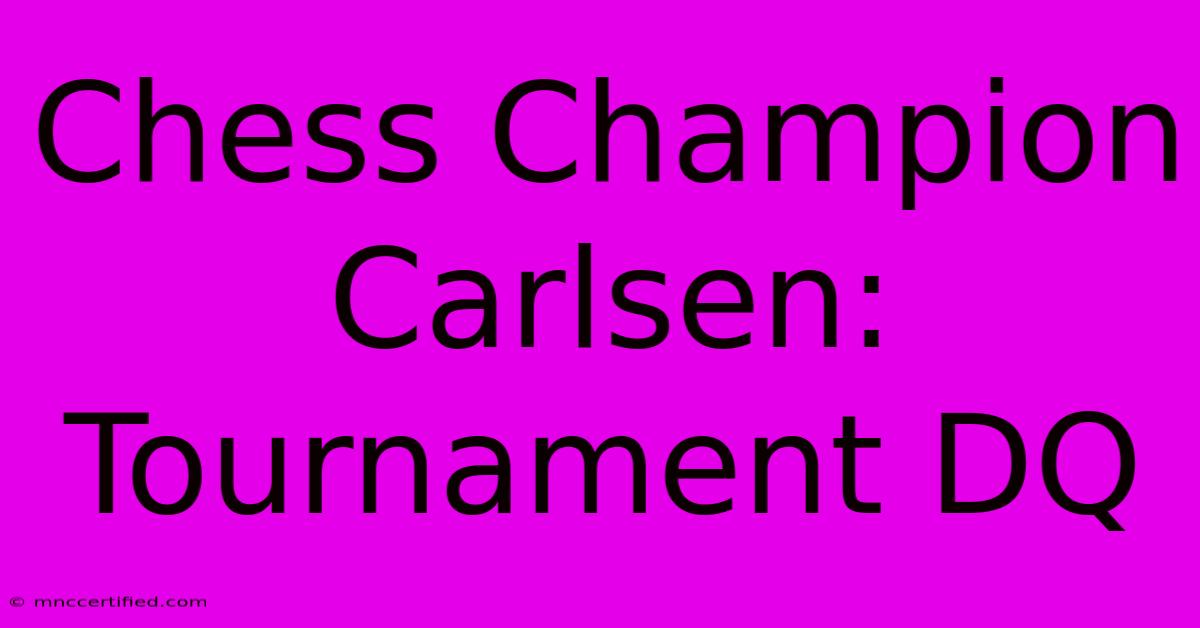Chess Champion Carlsen: Tournament DQ

Table of Contents
Chess Champion Carlsen: Tournament Disqualification – A Shocking Turn of Events
The chess world was recently rocked by the unexpected disqualification of reigning world champion Magnus Carlsen from the Julius Baer Generation Cup. This unprecedented event sparked widespread debate and speculation, leaving fans and commentators scrambling for answers. This article delves into the details surrounding Carlsen's disqualification, exploring the potential causes and ramifications of this shocking turn of events.
The Disqualification: What Happened?
Magnus Carlsen, a name synonymous with chess mastery and unwavering composure, was disqualified from the Julius Baer Generation Cup for failing to appear for his scheduled game against Hans Niemann. This wasn't a simple missed match; it was a deliberate absence that resulted in a forfeiture and subsequent disqualification from the prestigious tournament. The lack of explanation from Carlsen himself only fueled the flames of speculation.
The Mystery Surrounding Carlsen's Absence
The silence surrounding Carlsen's actions only amplified the intrigue. While some suggested technical difficulties or a personal emergency, the lack of official communication from Carlsen or his team left many to believe there was a deeper, more strategic reason behind his absence. The absence of a clear and concise explanation contributed to the intensity of the aftermath.
The Hans Niemann Factor: Allegations of Cheating
The timing of Carlsen's disqualification coincided with ongoing accusations against his opponent, Hans Niemann, of cheating. Niemann's history includes previous accusations of online cheating, sparking a significant amount of controversy within the chess community. While no concrete evidence directly linked Niemann to cheating during this particular game, the timing and the overall context fueled intense speculation. The coincidence raised questions about whether Carlsen's actions were a protest against Niemann's alleged past transgressions.
The Ethical Dilemma: Protest or Poor Sportsmanship?
Carlsen's actions presented a significant ethical dilemma. Was his disqualification a powerful, albeit unconventional, protest against suspected cheating in professional chess? Or was it a display of poor sportsmanship, undermining the integrity of the tournament and disrespecting his opponents? This nuanced question sparked fierce debate among chess enthusiasts and experts alike. Many questioned whether a more appropriate response would have been a formal complaint or a public statement, rather than a self-imposed disqualification.
Ramifications and Future Implications
Carlsen's disqualification had significant repercussions. It cast a shadow over the tournament, overshadowed the achievements of other players, and raised concerns about the future of fair play in professional chess. The incident highlighted the challenges of dealing with cheating allegations and the need for transparent and robust anti-cheating measures within the chess world. The long-term consequences are still unfolding, with questions about Carlsen's future participation in tournaments and the ongoing debate surrounding the effectiveness of current anti-cheating protocols in professional chess.
The Need for Transparency and Accountability
The incident underscores the urgent need for increased transparency and accountability in the chess world. Clearer protocols are needed for handling cheating accusations, alongside stronger measures to deter potential infractions. Improved technology and stricter regulations could potentially help address these challenges.
Conclusion: A Turning Point for Chess?
Magnus Carlsen's disqualification from the Julius Baer Generation Cup was undoubtedly a shocking and unprecedented event. While the exact reasons behind his actions remain unclear, the incident has undeniably ignited a critical conversation about fair play, ethics, and the future of professional chess. The aftermath serves as a pivotal moment, highlighting the need for robust anti-cheating measures, increased transparency, and a renewed commitment to upholding the integrity of the game. Only time will tell the true impact of this controversial event on the world of chess.

Thank you for visiting our website wich cover about Chess Champion Carlsen: Tournament DQ. We hope the information provided has been useful to you. Feel free to contact us if you have any questions or need further assistance. See you next time and dont miss to bookmark.
Featured Posts
-
Reddys Promise Indias Future
Dec 29, 2024
-
Solebury Models Death Police Update
Dec 29, 2024
-
Is Broncos Vs Bengals On Tv Today
Dec 29, 2024
-
Schefflers Christmas Dinner Mishap
Dec 29, 2024
-
Former Champion Paul Bamba Passes At 35
Dec 29, 2024